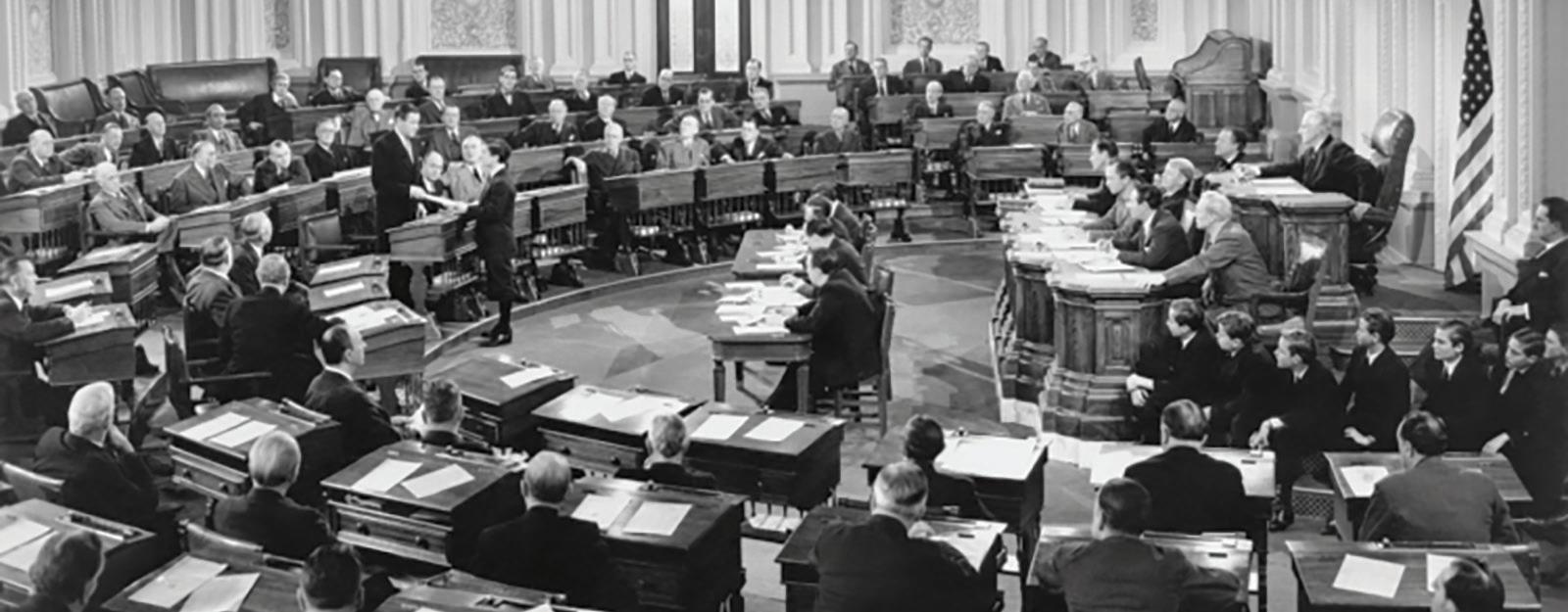CalHFA More Mortgage Relief for California Families
Earlier this month, the California Housing Financing Agency (CalHFA) and the Sacramento branch of NeighborWorks held a press conference at the State Capitol to announce the expansion of California’s mortgage relief program. “Over the past year, the California Mortgage Relief program has been helping Californians that are most vulnerable to overcome the financial challenges brought on by the COVID-19 pandemic,” said Tiena Johnson Hall, Executive Director of the California Housing Finance Agency.
One of the major new changes to eligibility, CalHFA officials say, applies to those who own residences with up to four units. Those homeowners can now apply for assistance. Relief through the program has also extended to those with partial-claim second mortgages or loan deferrals from the beginning of 2020.
Additionally, for homeowners who have missed at least two mortgage payments or one property payment before March 1st of this year, the delinquency date for payments has been reset.
Previous beneficiaries of the program are now eligible for additional funds that could add up to $80,000 in total aid. Officials say the program is meant for those who have had trouble keeping up with housing payments due to the COVID-19 pandemic.
Funding for the California Mortgage relief program comes from the Federal Government’s American Rescue
Plan Act’s Homeowners Assistance Fund implemented in 2021, which allocated $1 billion for eligible homeowners across the country.
According to Hall, the program has distributed federal grants and funds to over 10,000 California homeowners.
Not only is applying to the program free, she says, homeowners do not have to worry about paying back the relief funds.
The program is provided to homeowners through the CalHFA Homeowner Relief Corporation.
During the press conference held in the first week of Black History Month, Hall made a point to mention that those who tend to struggle with homeownership in California and the nation at large are Black.
«Black communities have been shut out of homeownership by a variety of factors including discriminatory housing practices which equates to less generational wealth,» said Hall.
Homeownership is an incredibly important tool in building generational wealth, according to the U.S. Department of Housing and Urban Development.
Volma Volcy, Founder and Executive Director of the Ring of Democracy, said it is important to secure the prosperity of neighborhoods where residents are at risk for foreclosure.
“When a family is displaced, a whole community is destroyed,” said Volcy.
Volcy also said that the California Mortgage Relief Program has been successful so far in providing aid for those in fear of losing their homes due to pandemic-related financial hardships.
Tulsa Race Massacre Survivors to Receive Ghanaian Citizenship
By Stacy M. Brown NNPA Newswire Senior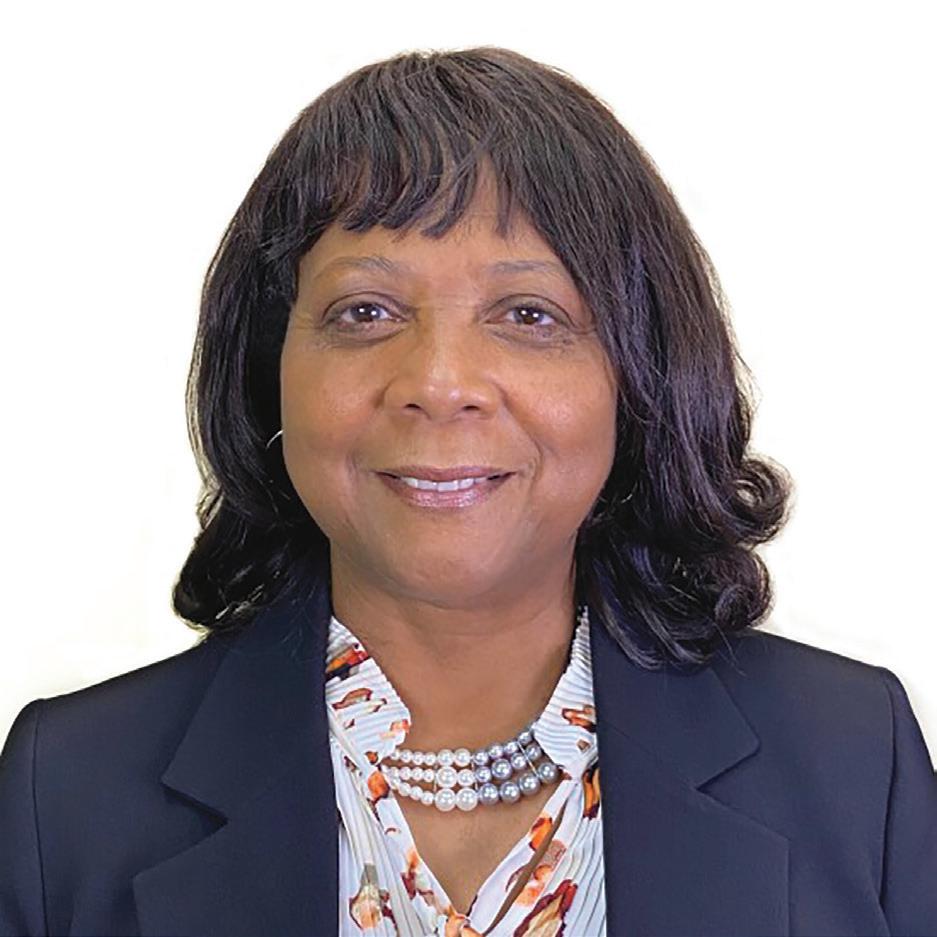
Africa Forum, and Osu Traditional Council honored the Fletcher and Ellis in Accra with a naming ceremony.
Media Drop Dilbert after Creator’s Black ‘Hate Group’ Remark
The creator of the Dilbert comic strip faced a backlash of cancellations Saturday while defending remarks describing people who are Black as members of “a hate group” from which white people should “get away.”
Various media publishers across the U.S. denounced the comments by Dilbert creator Scott Adams as racist, hateful and discriminatory while saying they would no longer provide a platform for his work.
Andrews McMeel Syndication, which distributes Dilbert, did not immediately respond Saturday to requests for comment. But Adams defended himself on social media against those whom he said ‘’hate me and are canceling me.”
Dilbert is a long-running comic that pokes fun at office-place culture.
The backlash began following an episode this past week of the YouTube show, “Real Coffee with Scott Adams.” Among other topics, Adams referenced a Rasmussen Reports survey that had asked whether people agreed with the statement “It’s OK to be white.’’
Most agreed, but Adams noted that 26% of Black respondents disagreed and others weren’t sure.
The Anti-Defamation League says the phrase was popularized in 2017 as a trolling campaign by members of the discussion forum 4chan but then began being used by some white supremacists.
Adams, who is white, repeatedly referred to people who are Black as members of a “hate group” or a “racist hate group” and said he would no longer “help Black Americans.’’
“Based on the current way things are going, the best advice I would give to white people is to get the hell away from Black people,” Adams said on his Wednesday show.
In another episode of his online show Saturday, Adams said he had been making a point that “everyone should be treated as an individual” without discrimination.
‘’But you should also avoid any group that doesn’t respect you, even if there are people within the group who are fine,” Adams said.
“This is a decision based on the principles of this news organization and the community we serve,” wrote Chris Quinn, editor of The Plain Dealer. “We are not a home for those who espouse racism. We certainly do not want to provide them with financial support.’’
Christopher Kelly, vice president of content for NJ Advance Media, wrote that the news organization believes in “the free and fair exchange of ideas.”
“But when those ideas cross into hate speech, a line must be drawn,” Kelly wrote.
National Correspondent
Viola Fletcher, the 108-year-old survivor of the Tulsa Race Massacre of 1921, and her 101-year-old brother, Van Ellis, will acquire Ghanaian citizenship during a ceremony at Ghana’s embassy in Washington on Tuesday, Feb. 28.

In 2021, Fletcher, called “Mother Fletcher,” and Ellis, often called “Uncle Red,” traveled to Ghana for the first time.
The visit was part of Ghana’s Remembrance Day.
For Fletcher and Ellis, it also counted as a time of reflection on the Tulsa massacre, which left about 300 dead, hundreds more injured, and 10,000 African Americans homeless.
The pair returned to Ghana this month but will attend the citizenship ceremony organized by the Ghana Tourism Authority, members of the government, and H.E. Dr. Erieka Bennett, the founder, and head of mission at the Diaspora African Forum.
The Ministry of Tourism, Arts, and Culture, the Ministry of Interior, and the Ghana Tourism Authority will host the 11 a.m. event.
“The family is honored to be receiving Ghanian citizenship for our priceless Black icons,” Ike Howard, Mother Fletcher’s grandson, told NNPA Newswire from Africa.
“Mother Fletcher wanted to visit the Motherland before she caught her wings,” Howard stated. “Now she has the option to live in the Motherland.”
In 2021, the Ghana Tourism Authority, Diaspora
Fletcher received the name Naa Lameley.
Ellis was given the name Bio Lantey. Both received certificates with their new African names.
“The naming ceremony is for our brothers and sisters to reconnect with them and welcome them back home, and also to review their identities as Africans and Ghanaians, to be precise,” Deputy Minister of Arts, Culture, and Tourism Mark Okraku Mantey said.
“Ghana is a hospitable country, and I am sure you have seen places, worn Ghana, eaten Ghana, and heard Ghanaian music. Share the word that Ghanaians love people, especially Black people,” Mantey declared.
H.E. Bennett said Fletcher and Ellis combined for more than 200 years of history and experience of the diaspora and are an embodiment of the strength and resilience of the African spirit. She said their history would live forever, and all generations would come to hear about them.
“DAF together with GTA intends to do a memorable ceremony at the Ghana Embassy in Washington at the end of Black History Month,” H.E. Bennett wrote in a Jan. 26, 2023, letter to the CEO of the Ghana Tourism Authority.
“We have engaged Tyler Perry, the world-renowned actor, playwright, author, songwriter, entrepreneur, and philanthropist, to film this ceremony as a documentary,” she stated.
Mother Viola Fletcher
Obesity Care Week Begins as Report Reveals that Nearly
50% of Blacks are Obese
By Stacy M. BrownNNPA Newswire Senior National Correspondent
Obesity Care Week 2023 (OCW) kicked off on Monday, Feb. 27, with a focus on the disproportionate impact of obesity on communities of color.
Health officials responsible for OCW said racial and ethnic minorities have a higher rate of chronic diseases. African Americans have the highest rate of chronic diseases.
According to recent data, almost 50% of African Americans have obesity, and approximately 4 out of 5 Black women have overweight or obesity.
The causes of obesity are complex, and a person’s access to healthy food, safe places to exercise and play, stable and affordable housing, access to quality health care, and social attitudes about body weight all play a role in whether a person will have obesity.
However, communities of color face unique challenges in each of these areas, health officials stated.
For example, in the United States, only 8% of African Americans live in a census tract with a supermarket, while 31% of white Americans have one.
This means that minorities more often shop in small stores or bodegas or eat at fast food restaurants. These places usually have less fresh food and more processed food.
Cultural attitudes about body weight also play a role, with non-Hispanic white women more satisfied with their body size than non-Hispanic Black women, and Hispanic women more interested in losing weight and eating healthy.
Evidence shows that the African American population has less of an impact on existing weight loss interventions, with Black men and women achieving smaller weight losses.

Health officials noted that this suggests that intensive behavioral programs result in lower levels of adherence in
According to recent data, almost 50% of African Americans have obesity, and approximately 4 out of 5 Black women have overweight or obesity.
Black people than whites.
Founded in 2015, Obesity Care Week has a global vision for a society that values science and clinically based care and understands, respects, and accepts the complexities of obesity.
Organizers have focused on changing the way society cares about obesity and have worked to empower individuals by providing affordable and comprehensive
care and prevention programs, increasing awareness of weight bias, and working to eliminate obesity.

Researchers said obesity not only affects overall health, but it also increases the risk of complications from COVID-19.
According to a recent study of hospitalized patients in the US, obesity may also predispose patients to getting the virus and is the strongest predictor for COVID-19 complications.
Unfortunately, African Americans are also disproportionately affected by COVID-19. According to the CDC, 33% of those hospitalized with the virus were African Americans, compared to 13% of the US population.
Inequities in access to and quality of care result in poor overall health and many chronic diseases, such as obesity and diabetes.
This can affect individuals’ chances of getting COVID-19.
The communities in which African Americans live may place them at greater risk for developing chronic illnesses. For example, they may not have access to healthy foods or safe places to play or exercise.
For people who try to eat healthy, living in a food desert means that they must go to a grocery store.
They often must do this by public transportation.
These disparities need to be addressed so that all communities have the resources and support they need to achieve and maintain a healthy weight.
“Obesity Care Week 2023 highlights the need for comprehensive and inclusive approaches to obesity care that consider the unique challenges faced by communities of color,” organizers stated.
Copyright 2023 The Associated Press. All rights reserved. This material may not be published, broadcast, rewritten or redistributed without permission.
Florida Arrest Warrant Issued for Rapper Kodak Black
FORT LAUDERDALE, Fla. (AP) - A Florida judge has issued an arrest warrant for rapper Kodak Black for failing a drug test while on bail for a drug charge, court records show.
The warrant was issued Thursday after Black, whose legal name is Bill Kapri, did not appear for a scheduled drug test in early February and then days later submitted a sample that tested positive for fentanyl, according to records.
Broward County Judge Barbara Duffy issued the warrant and wrote that the rapper had violated the conditions of his pretrial release for an oxycodone trafficking charge from July.
Black had pleaded not guilty to the trafficking charge. His attorney was not immediately available to comment on Sunday.
In January 2020, then-President Donald Trump commuted a three-year federal prison sentence the rapper had for falsifying documents used to buy weapons. Black had served about half his sentence.
Black is nominated for the iHeartRadio Music Awards’ hip-hop artist of the year and has sold more than 30 million singles, with massive hits such as “Super Gremlin,” which reached number three on the Billboard Hot 100 last year.
Copyright 2023 The Associated Press. All rights reserved. This material may not be published, broadcast, rewritten or redistributed without permission.

Angela Bassett Top NAACP Image Awards
PASADENA, Calif. (AP) – Angela Bassett won entertainer of the year at Saturday’s NAACP Image Awards on a night that also saw her take home an acting trophy for the television series “9-1-1.”
The Bassett-led Marvel superhero sequel “Black Panther: Wakanda Forever” won best motion picture at the ceremony, which was broadcast live on BET from Pasadena, California.
Viola Davis won outstanding actress for the action epic “The Woman King,” a project she championed and starred in. Will Smith
“I never want to not be brave enough as a woman, as a Black woman, as an artist, ‘’ Davis said, referencing a quote from her character in the film, which she called her magnum opus. “I thank everyone who was involved with ‘The Woman King’ because that was just nothing but high-octane bravery.”
“Abbott Elementary” won for outstanding comedy series. Creator and series star Quinta Brunson invited her costars onstage and praised shows like “black-ish” for paving the way for her series.
The 54 NAACP Image Awards were presented Saturday in Pasadena, California, with Queen Latifah hosting. Serena Williams received the Jackie Robinson Sports award, which recognizes individuals in sports for high achievement in athletics along with their pursuit of social justice, civil rights and community involvement. The ceremony, which honors entertainers, athletes and writers of color, was hosted by Queen Latifah. Special honorees included Dwyane Wade and Gabrielle Union and civil rights attorney Ben Crump.
Global $80 Million E-Commerce Brand
Sassy Jones, Opens First Brick-and -Mortar Retail Store in Richmond, VA
RICHMOND, VA — Sassy Jones, the nation’s fastestgrowing privately held retail brand, which launched in the founder’s minivan where she drove across the country to various trade shows after giving birth to her then 4-monthold twins, is now a multimillion-dollar enterprise that designs incredibly unique jewelry, audacious ready-towear women’s clothes, and accessories. If you own a piece of Sassy Jones, you understand you are purchasing not only a product, but empowerment and purpose. Additionally, every purchase benefits menstrual poverty to young African girls. “I am thrilled to open our first location where customers near and far can come for a fully immersive

shopping experience,” said Charis Jones, Founder and CEO of Sassy Jones. “A place where the unicorns can play – it isn’t about the purchase, it’s about how each customer feels. I want the Sassy Jones woman to walk away with more than just a handbag, I want her feeling gorgeous, connected and loved. This location will be the first of many to do just that.”
Teaching women to be fearlessly unapologetic with their style choices, the success of Sassy Jones is attributed to the brand’s cult-like fanbase, which grew rapidly after a series of Sparkle Parties – the brand’s weekly show garnering more than 30k viewers which teaches women how to feel undeniably confident in the brand’s newest arrivals. The
Sparkle Party gained popularity among celebrities like Kim Coles, Cynthia Bailey and some of “The Real Housewives.” Today, the multimillion-dollar brand has scaled to three warehouses, employing a team of over 40 employees, and has amassed countless national recognitions, including ranking at No. 24 on Inc. 5000’s list of fastest-growing, privately held businesses measured by revenue and growth with 12,000% growth. Sassy Jones was also named by Forbes as a top brand that thrived during the pandemic and continues to be a lifestyle brand that caters heavily to Black women, a market that is underserved by major fashion labels.
A New Bill in Florida Would Give the Governor Complete Control Over the State’s Higher Education System
By Stacy M. BrownWI Senior Writer
In perhaps the most racist, sexist, homophobic, and xenophobic bill crafted since the end of slavery in America, Florida Gov. Ron DeSantis and his Republican cronies have authored a bill that takes “breathtaking control of viewpoint and content throughout all academic activity in the entire Florida system.”
HB 999 says that all colleges and universities must not spend money on education programs, or other things that support diversity, equity, and inclusion.
“This bill is a road map for wrecking one of our great state systems of higher education,” the University of Michigan Law Professor Julian Davis Mortenson tweeted.

The bill eliminates Women’s and Gender Studies as a major or minor at state colleges and universities.
It dictates that there can’t be a major or minor that is “based on the belief system of Critical Race Theory.”
According to the text of the bill, the university president or board would do all faculty hiring. It asserts that they “may not delegate” any aspect of any hiring decision or hiring authority to any group or faculty however constituted.
BakersfieldNews Observer
Adjudicated a Newspaper of General Circulation August 11, 1980, Kern County Superior Court Decree, Case No. 16964, Government Code 6023.
Bulk Mailing Permit 724 Bakersfield, CA 93385
Published By Observer Group Newspapers of Southern California, Inc. Corporate Office 1219 20th St. Bakersfield, CA 93301 (661) 324-9466.
Member of The National Newspapers Publishers Association, Associated Press, and The Better Business Bureau
President: Ellen Coley
CEO: Jon Coley
Publisher/ Editor: James Luckey Jr. Operations Manager: James Luckey
Credo-The Black Press believes that America can best lead the world away from racial and national antagonisms when it accounts to every person, regardless of race, color, or creed full human and legal rights. Hating no person, fearing no person, the Black Press strives to help every person in the firm belief that all are hurt as long as any one is held back.
The Observer Group Newspapers reserves the right to publish views an opinions that may not necessarily reflect those of the staff and management and are solely the product of the responsible individuals who submit commentaries published in these newspapers. Letters, articles and comments appearing in the Observer Newspapers reflect the opinions of the contributor and do not constitute the opinion or endorsement by The Observer Newspapers or its staff. The Observer Group Newspapers assumes no responsibility for photographs, articles, letters, press releases and unsolicited materials. Decisions as to the editing and publishing of materials are at the discretion of the Publisher and Editors. All rights are reserved on materials accepted for publication unless otherwise specified.
Bakersfield News Observer
Los Angeles News Observer
The Valley’s News Observer
1219 20th St. Bakersfield, Ca 93301 Mailing
Address P.O. Box 2341 Bakersfield, CA 93303 Phone (661) 324-9466 Fax (661) 324-9472
Emails and general info: observernews@gmail. com, Advertising: observeradvertising@gmail. com Available online: www.ognsc.com
Further, the bill asserts that they are “not required to consider recommendations or opinions of faculty.”
Jeremy C. Young, Pen America’s senior manager of Free Expression and Education, called the bill “terrifying.”
Pen America is a non-profit group that protects and promotes free speech around the world by promoting literature and human rights.
“Florida HB 999 would enact the most Draconian and censorious restrictions on higher education in the history of this country,” Young stated.
“The bill would make tenure and faculty hiring committees meaningless, ban diversity statements, and centralize control of core curricula and mission statements in the hands of political appointees,” Young said.
“Unexpectedly, it would also ban gender studies majors.”
Florida’s HB 999 would end state public higher education in favor of one man’s authoritarian control of public university decisions and end academic freedom and shared governance, Young added.
He observed that the bill would stop higher education in Florida from being a place where people could ask questions and speak their minds freely.
“Free expression and higher education advocates must fight these provisions with everything we have, in Florida and any other state where they appear,” Young demanded.
“HB 999 is the central battleground for the soul of higher education. If we stand on the sidelines, we will lose.”
DeSantis has repeatedly said he would fight censorship against Floridians from big tech companies and social media platforms.
He also said the state should ban “ideology” and “indoctrination” in state schools.
The bombastic governor said Florida education should be “rooted in the values of liberty and the western tradition” and block public institutions from “supporting campus activities or programs that promote” so-called divisive concepts such as CRT or DEI.
The new law would build on the governor’s Stop WOKE Act from 2022, which says that certain ideas about race can’t be taught in schools.
The new bill would prohibit specific academic
concepts, putting the governor’s calls into legislation. The bill text states the hiring process rule applies to any position at a university, including the president.
Further, faculty members’ tenure status would also be open for review by the board of trustees at the request of a board’s chair.
HB 999 prohibits officials from using university resources to “promote, support, or maintain any programs or campus activities that espouse diversity, equity, and inclusion, whether directly or through contracts, grants, or service agreements.”
In January, DeSantis talked about tenure and hiring practices for Florida universities.
He said the change would allow the state to prevent “certain worldviews” from being promoted when faculty committees make academic hiring decisions. Study of Western civilization, the U.S. Constitution, the Bill of Rights, subsequent amendments, and the Federalist Papers would also be required.
There are also requirements and changes for college and university courses focusing on social sciences and behavior, natural sciences, and math.
If the bill passes the Florida Legislature, it will take effect on July 1.
Biden Brokers Deal for Fair and Peaceful Nigeria Election
By Stacy M. BrownNNPA Newswire Senior National Correspondent Nigerians are set on Saturday, Feb. 25, to vote in presidential and parliamentary elections that are seen as the most wide-open since Africa’s most populous nation
switched from military rule to Democracy in 1999.
And U.S. President Joe Biden declared that America wants a peaceful and fair election in the western African nation. Biden helped to broker a peace deal that political
parties and candidates in Nigeria’s presidential election signed this week.
By signing the accord, the parties and candidates committed to accepting the election results that the independent National Electoral Commission will announce.
They’ve also agreed to a peaceful transfer of power.
“Elections are a fundamental part of a functioning democracy, and all Nigerians deserve this chance to choose their future freely and fairly,” Biden stated.
“While the United States does not support any single candidate or party, we strongly support a peaceful and transparent process that reflects the will of the people of Nigeria.”
Biden also encouraged Nigerians to use their freedom of speech to make their voices heard, including young people who may be going to the ballot box for the first time.
Eighteen candidates are vying to succeed President Muhammadu Buhari, including former Vice President Atiku Abubakar (Peoples Democratic Party), 76, the main opposition candidate; Peter Obi (Labour Party), 61, whom media reports suggest is popular among young voters; and Bola Tinubu, 70, the ruling party (All Progressives Congress) candidate.

More than 93 million people have registered to vote in the contest, and about 176,600 polling stations have been set up across the country.
Some of these stations are in places where people have been moved because of fighting between Islamists and federal troops.
“The United States stands with the Nigerian people as they chart a path toward a more democratic, prosperous, and secure future,” Biden asserted.
“I appreciate President Buhari’s firm commitment that the will of the people will be respected. And in the coming days, I encourage voters to remain peaceful and patient as their ballots are tallied and urge the political parties and candidates to live up to their pledge.”
Rihanna, Wealthiest Super Bowl Entertainer Ever!
With a net worth of $1.7 billion, Rihanna, who was born Robyn Rihanna Fenty, sits at the pinnacle of a Super Bowl list that includes Dolly Parton, Jennifer Lopez, Bruce Springsteen, Diana Ross, Beyonce, Madonna, Bruno Mars, Katy Perry, Gloria Estefan, Alicia Keys, Bono, Dr. Dre, Billy Joel, Garth Brooks and numerous other world-famous performers, according to Forbes.
By Joseph Green-Bishop Texas Metro News CorrespondentWhen Rihanna, the Barbadian-megastar and successful cosmetics and lingerie executive, took the Super Bowl LVII stage a week ago, approximately 100 million television viewers witnessed the wealthiest halftime performer in the history of the annual event.

With a net worth of $1.7 billion, Rihanna, who was born Robyn Rihanna Fenty, sits at the pinnacle of a Super Bowl list that includes Dolly Parton, Jennifer Lopez, Bruce Springsteen, Diana Ross, Beyonce, Madonna, Bruno Mars, Katy Perry, Gloria Estefan, Alicia Keys, Bono, Dr. Dre, Billy Joel, Garth Brooks and numerous other worldfamous performers, according to Forbes.
Jay-Z, himself a billionaire entertainer, described Rihanna as a “generational talent who has exceeded all expectations in every instance. She is one of the industry’s most prominent artists,” he said. This year’s Super Bowl was played on February 12th in Glendale, AZ. The event,
held at State Farm Stadium, was the first time that both teams were led by an African American quarterback.
“It is awesome that Rhianna has accomplished so much at such a young age,” said Yolanda Frazier Gills, the founder of Frazier Gills, a certified tax resolution firm in Dallas, a former chairperson of the Oak Cliff Chamber of Commerce. “She is an example of wealth building, and of controlling her own destiny. We need more role models like her.”
The 57th Super Bowl took place on February 12th at State Farm Stadium in Glendale, AZ. Apple Music partnered with the National Football League in producing the event, according to league officials. “Rihanna has been a cultural force throughout her career,” said Seth Dudowsky, an awarding-winning music executive, who is also the director of music for the NFL. “We are thrilled to welcome Rihanna to the Apple Music Super Bowl Halftime stage” Mr. Dudowsky said.
Review: Michael B. Jordan Delivers a Brawler in ‘Creed III’
 By LINDSEY BAHR
By LINDSEY BAHR
AP Film Writer
It must be a daunting prospect to pick up a franchise on the third movie. Add in the pressure of following filmmakers like Ryan Coogler and Steven Caple Jr. in your directorial debut that you're also starring in and it's enough to make you wonder what on earth Michael B. Jordan was thinking.
But " Creed III," in theaters nationwide Friday, is a new start for Adonis Creed. He's finally out of the shadow of his father Apollo and Rocky Balboa, whose legacy loomed large over the first two films (Sylvester Stallone decided "Creed II" would be his last). With Rocky out of the way, and the younger Creed solidly in place as the best in the world, the franchise can breathe a little and grow.
Enter the Dame (not that kind of dame).
This one is in the form of Jonathan Majors, an old buddy from their teenage years in a group home in the early 2000s. Dame, or Damian Anderson, is a bit older than Creed. He's the one who's boxing in the underground matches at night. The young Creed (Thaddeus J. Mixon), a little awkward, a little too eager to please and a little too ready for trouble, is the one carrying water (and bags and gloves) and helping him strategize. There is a palpable menace established early on with these two - an unequal
power and age dynamic, sure, but also the implication that Dame (Spence Moore II) is more than willing to play dirty. He carries a gun. He fixes games. And he has a hold on young Adonis. The flashback ends with a violent altercation outside a convenience store. Dame goes away. Creed becomes Creed.
This flashback is important but does get the film off to a bit of a slow start, jumping forward chronologically to Creed's last fight and then to his present- day retirement life - a luxurious and tranquil existence in the Hollywood Hills in a modernist mansion with his daughter Amara (Mila Davis Kent) and wife Bianca (Tessa Thompson), who has given up singing mostly to produce hit records.
Life is nice for the obscenely rich in LA: The clothes are expensive, the cars are price upon request, the house always spotless and the staff unseen (save for a chef in one scene).
At the gym run by Duke (Wood Harris), he's trying to mentor the next generation of champions.
Then Dame re-appears and the movies gets its urgency back. His old pal was locked up for 18 years after that incident and is freshly out of prison, wanting to pick up his life and his boxing aspirations where he left off. Creed is pleasant but guarded - for much of the film he acts like an aloof celebrity, hyper conscious of not letting anyone in too close and compartmentalizing the uglier aspects of his past. Still, he takes him out to lunch and offers to help him
in any way he can. This is both the right thing to do and also a huge mistake. "Creed III" is, among other things, about what happens when men don't talk about their feelings (and ignore Duke's advice).
At times, it also feels more like a thriller than a sports film as you watch Dame infiltrate Creed's world. It's always Creed's idea, there's always an invitation, but Dame's sudden omnipresence starts to feel unavoidable and ominous. Dame has a bit of Eve Harrington in him, but also a very real, very relatable chip on his shoulder for the time he lost. In another movie, he could very well be the underdog we're rooting for - some of the audience may be rooting for him even so.
Lurking behind everything is the madness that comes from not being able to do what you were born to do. It's something athletes grapple with earlier than most other professionals. An injury at 23 could take you out when you're just getting started and in this film Creed, Dame and Bianca are having similar existential crises - though Dame's desperation is the driving force behind everything that happens.
Jordan and his filmmaking team craft two particularly stunning matches full of suspense, drama and slow motion sweat beads flying through the air. These are only lessened by the cheesy, unhelpful announcers spouting cliches and
no actually helpful exposition or explanation outside the ring. And ultimately, it's a promising debut for the 36-yearold, who shows here that he'll never let his own star ego get in the way of a film: Majors steals the show, and Jordan is there to capture it.
There's a comforting but predictable rhythm to a boxing franchise like Rocky and now Creed. The movies must keep justifying themselves, inventing new challenges that make them all feel different enough. But most essentially boil down to the same framework: You have to knock the champion down to a believable underdog again. While there is a case to be made for the final fight to, let's just say, go a different way than it does, "Creed III" is still a knockout.
"Creed III," an MGM release, is rated PG-13 by the Motion Picture Association for, "Violence, some strong language and intense sports action." Running Time: 116 minutes. Three stars out of four. -- MPA Definition of PG-13: Parents strongly cautioned. Some material may be inappropriate for children under 13. -- Follow AP Film Writer Lindsey Bahr on Twitter: www.twitter.com/ldbahr.

Features
Reparations: San Diego Tax Code

Discussion was Preamble to Task Force
Antonio Ray Harvey
California Black Media
The tax discussion, held about a month ago, was as a lead-in to the task force’s next meeting in Sacramento focused on compensation and titled “Redressing the Harms Delineated in Report 1.” That meeting will be held Friday, March 3 and Saturday March 4 at the Byron Sher Auditorium at the California Environmental Protection Agency (CalEPA) Headquarters, beginning at 9 a.m. both days.
Moore-Johnson kicked off her presentation at the San Diego meeting during a panel titled “The Forgotten 40 Acres: Repairing Wealth Disparity Using the Estate Tax and New Charitable Incentives.” She said, “the tax code has incentivized White wealth building for years,” and that she and Odom have now found a way to redistribute wealth through tax exemptions at the state level.
“For years, Ray and I intuitively understood that if we could harness those tax incentives to create a public-private partnership to help fund reparations we could get our wealthy clients to willingly enthusiastically embrace using their own money to pay for reparations,” Moore-Johnson said. “We believe that tax deductions should be allowed for private contributions to racial repair because individual taxpayers would be paying a debt of the federal or state government on the government’s behalf,” MooreJohnson said.
Potential revenue sources, the attorneys say, could be the state estate tax, mansion tax, graduate property tax, and metaverse tax.
Johnson mentioned that the graduate property tax revenue would not apply to California because of Proposition 13, a law that restricts increases in the state tax code.
ODOM/MOORE-JOHNSON: Tax attorneys
Raymond Brown, and Sarah Moore-Johnson, (n the background talking to a reporter) testified at the last Reparations Task Force Meeting in San Diego on Jan. 28, 2023.The attorneys said reparations could be funded through a state estate tax. CBM photo by Antonio Ray Harvey

Two tax planning lawyers shared their perspectives on one of the ways to pay for the racial injustices suffered by Black Californians with the California Task Force to Study and Develop Reparations Proposals for African Americans. At the task force’s last two-day meeting held in San Diego on Jan. 27 and Jan. 28, the estate and tax planning attorneys Raymond “Ray” Odom and Sarah Moore-Johnson proposed several options to the nine-member task force for funding reparations through the federal tax code system -- including an estate tax as a means to increase racial equity.
Odom and Moor-Johnson’s presentation was a condensed introduction to the wealth disparity resulting from chattel slavery and Jim Crow law and the connection to wealth transfer and wealth taxation. Odom, however, emphasized that their idea to use the tax code is intentional but it is not a manipulation of the federal tax system.
“I really think that it is so important to set the narrative -- and that narrative isn’t around who’s getting something for nothing, but what we are going to do about this gross wealth disparity,” Odom said. “We need to solve this problem for all Americans, but especially for Black Americans.”
Odom – a Chicago estate and tax planning attorney who
works at Northern Trust and conducts racial wealth disparity speaking engagements across the country – is a fellow of the American College of Trust and Estate Counsel (ACTEC). He is one of five Black tax attorneys among ACTEC’s 2,500 fellows.
Established in Los Angeles in 1949, ACTEC is a nonprofit association of lawyers and law professors skilled and experienced in the preparations of wills and trusts; estate planning; and probate procedure and management of trusts and estates of the deceased, minors and helpless.
Odom and Moore Johnson explained that the racial wealth gap started to expand in 1981 when Ronald Reagan was in office and the biggest tax cut in history took place. Odom said reparations would be an opportunity to replace “swollen wealth” with the “stolen wealth” of Black people.
Moore-Johnson, an estate planning lawyer and a founding partner at Birchstone Moore in Washington DC, became president of the Washington, DC, Estate Planning Council three weeks after George Floyd was murdered in 2020. She is also an ACTEC fellow.
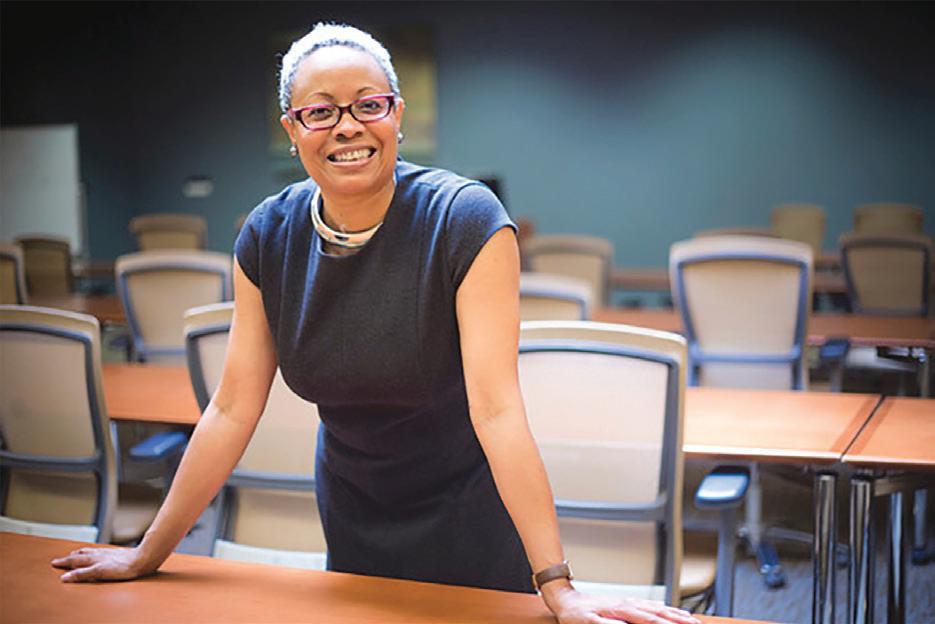
In March of 2021, during a national ACTEC meeting, Odom and Johnson came up with the idea of funding reparations for slavery through the estate tax. They started their research to better understand the history of slavery, post-slavery, reparations and the wealth gap. Through their research, the duo learned that the racial wealth gap exists, partly, because of the way the federal tax code is set up.
Task force member Sen. Steven Bradford (D-Gardena) stated that the tax attorney’s recommendations provided a “clear road map” to reparations.
“All that said, I think it’s comforting, informative and powerful,” Bradford said after the tax attorneys’ presentation. “As a legislator, the takeaway is, we can afford it. This is a debt that’s owed.”
Dorothy A. Brown addressed the task force by teleconference and shared her views about reparations and the tax code. She is a tax professor at Georgetown Law and the author of the book “The Whiteness of Wealth: How the Tax System Impoverishes Black Americans and How We Can Fix It.”
Brown’s literature goes to the core of how the complex federal
tax system disadvantages the Black community and how it has helped White households secure more solid financial standing.
“Our tax laws as written have a racially disparate impact. Black Americans are less likely to gain access to their tax breaks than their White peers receive,” Brown said. “Therefore, (Black Americans) are more likely to pay higher taxes than their White peers.”
Brown told the task force that she supports a “wealth tax credit applicable to all taxpayers and households,” which would serve the majority of Black people and be available to all “regardless of race and ethnicity.”
“I want to be clear that I’m not providing tax advice or guidance for providing a possible analysis of any reparations payments,” Brown said. “I leave it to your tax council (economic experts) to make a final determination that you would rely upon moving forward.”
The California Black Media Political Playback: “Black Women Get the Job Done”
Rep. Barbara Lee Holds First Campaign Rally in Oakland
Last Saturday, Rep. Barbara Lee held her first U.S. Senate campaign rally at Laney College in Oakland.
“We fight for freedom, for dignity, for justice, and, together, we win,” said Lee to a cheering crowd of supporters gathered at the Alameda County community college.
“That’s why I’m running for the United States Senate,”
continued Lee, who is the highest ranking African American woman in the U.S. Congress and the only African American so far in the 2024 California senatorial race.
Lee, 76, is serving her 12th term in the United States Congress. Known for her progressive politics, she joins the race to replace Feinstein against two other members of California’s delegation to the U.S. House of Representatives: Rep. Katie Porter (D-CA-37), 49, and Rep. Adam Schiff (D-CA-30), 62.
Several high-profile Bay Area politicians attended the rally, including San Francisco Mayor London Breed and Oakland Mayor Sheng Thao, the first Hmong-American mayor of a major American city.
“Black women have been at the forefront of frontlines of the fight for freedom and dignity and justice and peace for centuries. Black women get the job done,” said Lee.
The Bontas Have (Clearly) Moved On
After weeks of facing a torrent of criticisms coming from several journalists across California – including an editorial in the L.A. Times -- it seems Assemblymember Mia Bonta (D-Alameda) and her husband, California Attorney General Rob Bonta, have moved on.
Mrs. Bonta showed her support for Rep. Barbara Lee after the Congresswoman held the first rally of her senatorial bid on Bonta’s Alameda County home turf.
“Barbara Lee speaks for me,” said Mrs. Bonta who has been keeping herself occupied tackling other issues in her district, including the excessive use of force by law enforcement and the persistent digital divide affecting families of color.
Last week, Assembly Budget Committee chair Phil Ting (D-San Francisco) also released a statement assuring the public that Mrs. Bonta will not influence issues affecting her husband or the California Department of Justice (DOJ).
“Effective immediately in the Assembly Budget Committee, any state funding matters pertaining to the Department of Justice will be temporarily moved to and overseen by Budget Subcommittee 4,” said Ting. “DOJ’s proposed allocations will go through the same vetting process that all entities funding by California’s budget do, allowing for anyone to weigh in during public hearings.”
On Friday, Mr. Bonta delivered remarks at California’s commemoration of the National Day of Racial Healing.
While pushing back on the media attacks, the Bontas enjoyed support from some commentators.
“The media focus should be on covering both (Rob and Mia Bonta’s) efforts to promote public safety and make California a better place for all citizens. I urge all reporters and editors to uphold the principles of responsible journalism and prioritize the truth and accuracy of their reporting over sensationalism
and clickbait. The public deserves better than to be misled by unfounded innuendo,” said Paul Cobb, publisher of the Oakland Post. “The Black press has a responsibility to step up and do its part to foster a more informed and engaged public and not allow mainstream media and newspapers to marginalize Black leaders without pushing back especially when their reporting shows ignorance and fails to uphold the principles of responsible journalism.”
Assemblymembers Holden and Jones Sawyer Eye Futures in Local Gov’t
As their time in the state legislature gets closer to end due to term limits, California Legislative Black Caucus members Chris Holden (D-Pasadena) and Reggie Jones-Sawyer (D-Los Angeles) have announced their future political plans.
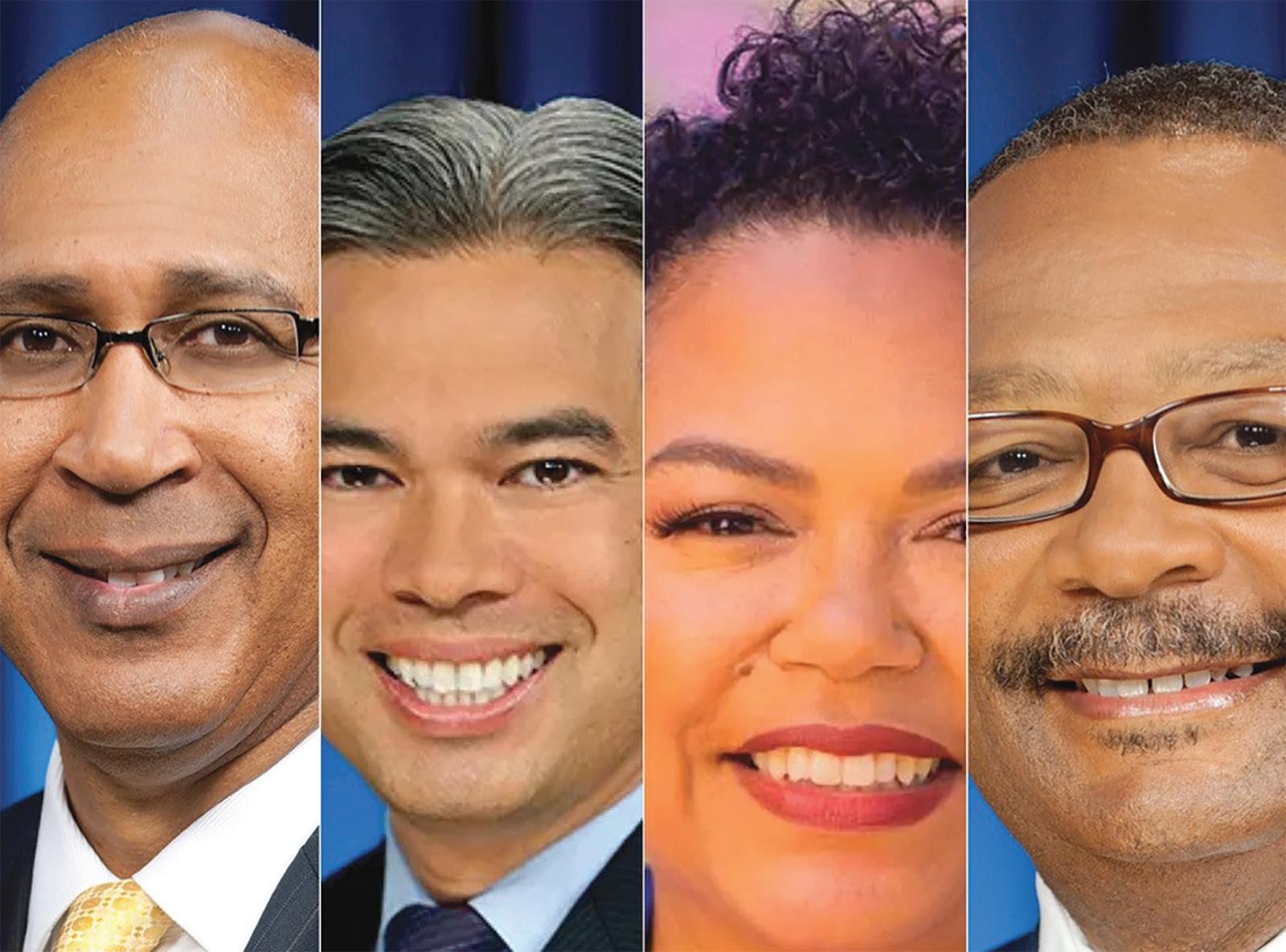
Assemblymember Holden is entering the race for the Los Angeles County Board of Supervisors (5th District). He’ll face Republican incumbent Kathryn Barger.
Assemblymember Jones-Sawyer is seeking to represent the 10th District on the Los Angeles City Council, hoping to replace Heather Hutt who was appointed to the seat because Mark Ridley-Thomas is under Federal indictment.
Each member elected on or after the passage of Proposition 28, in 2012, are allowed to serve a lifetime maximum of 12 years in the State Legislature, or a combination of service in the Assembly and Senate. Holden has been in office since December 2014 and Jones-Sawyer has served in the Assembly since December 2012.
Public Policy of California Releases Profile of Black Community
As Black History Month draws to a close, the Public Policy Institute of California has released a profile of Black Californians titled “California’s African American Community.” “One in 20 Black Americans lived in California in the most recent Census count, and California’s Black population is larger than that of all but five other states (Texas, Georgia, Florida, New York, and North Carolina),” the report reads before giving an overview of the history of Blacks in California and pointing out that only 3 % of California’s Black population are non-citizens and only 4% are naturalized.
According to the profile, Black Californians “lag behind other groups in college graduation, home ownership, and income.”
When it comes to political participation, Blacks engage in the electoral process at rates almost equal to their White counterparts. Read the full profile here.
Meet Amerrah Garrison, A Rising Hollywood Star and Lover of ‘People Stories’
 By Stacy M. Brown NNPA Newswire Senior National Correspondent Amerrah
By Stacy M. Brown NNPA Newswire Senior National Correspondent Amerrah
Garrison, also known as A.G. Oktoberose, has won Char’Actors Michigan’s Great “AGON” Ultimate Monologue Slam. A performance or competition known as a “Monologue Slam” is quite comparable to the more well-known “Poetry Slam.” In this version, however, actors gather, and each perform their own prepared monologue. The event, which took place during Black History Month in Detroit, brought together actors, comedians, and poets to compete in front of a critical audience. Despite being her first time participating in a monologue slam, Garrison emerged victorious. In an interview with NNPA Newswire, the Detroit native talked about her excitement, saying, “It was my first monologue slam, and I was very nervous and anxious. But it was the best of Michigan.” Garrison had to dig deep into her feelings to prepare for the competition so she could play a pregnant young woman with HIV. “I was wrapped in emotion,” the excited thespian exclaimed. “I had to portray a pregnant young woman who contracted HIV and whose husband had died. It was intense. To prepare for my monologue, I researched all I could on living with HIV and AIDS. In the end, I learned so much, and I know that’s what really helped me.” Her intense performance impressed the judges, earning her the coveted title of winner. Garrison, who is also an actress, model, writer, and singer, has over 15 years of experience in the industry. She is an inducted member of the International Thespian Society and a former MIFA Forensic theatre league regional

champion. Additionally, she has graced several runways and stages across Michigan, earning recognition as a published model and stylist in The Native Detroiter, Walk Magazine, Metro Mix, and Malvie Noir France. In an interview after the event, Garrison credited her coach and mentor, Shiek Mahmud-Bey, for pushing her to the next level. She posted a monologue on Instagram for critique, and he saw it. He congratulated her and said, “Yes, you can act, now let me show you how to take it to the next level.” Mahmud-Bey invited her to his class, and everything changed. She said she learned to look at scripts differently and can now tell if someone is acting or if they’re committed to the role. “Shiek brings out that rawness. He pushed me from the day I met him,” Garrison asserted. Garrison’s passion for acting has been with her since childhood. She said, “I grew up doing theater but started taking it seriously in high school. It was always a creative process. “You see films and act them out. I read books like Swiss Family Robinson as a 10-year-old and tried to act them out and have my siblings join,” she noted. “Actually,” Garrison added, “this was a way to have a career and not get in trouble for it. This is what I want to do.” Mahmud-Bey said Garrison’s win at the monologue slam is a testament to her talent and hard work. He said that her commitment to her craft and her desire to give her characters depth and emotion would help her stand out in the business. “I’ve always been fascinated with people stories,” Garrison insisted. “I always seek to find what’s beneath the surface with people. There is no dream role, I like to work, but people inspire me.”
Pursuing Martin Luther King Jr.’s Beloved Community
By Congressman James E. Clyburn (D-SC)
Martin Luther King, Jr. visited Ghana in 1957 to participate in the celebration of the country’s independence from British colonialism. Upon returning home, he delivered a sermon called “The Birth of a New Nation,”
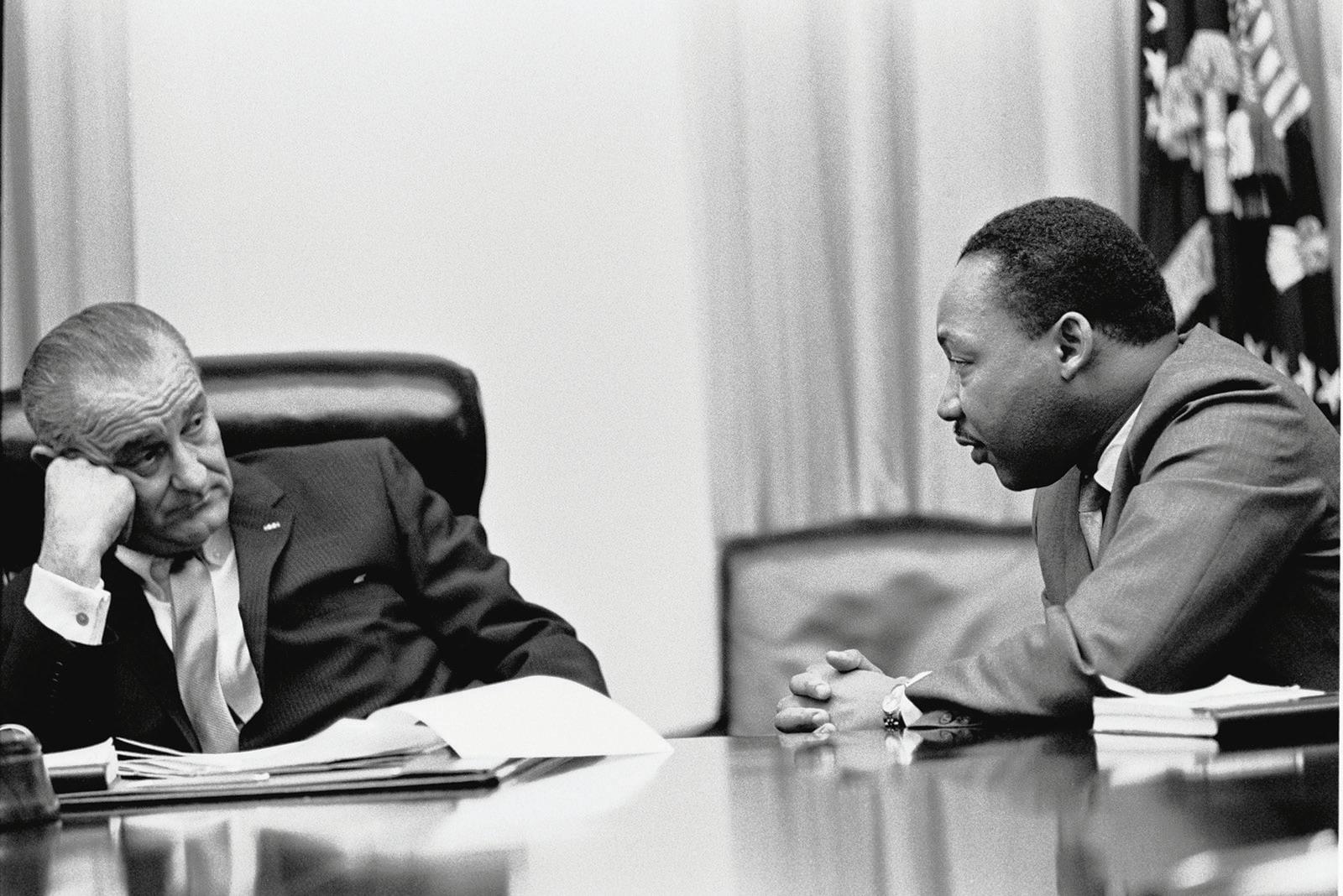
and introduced his idea for a post-Jim Crow society in this country. He explained the concept saying, “the aftermath of nonviolence is the creation of the beloved community.” He equated a beloved community to a successful country.
According to Dr. King, the creation of a beloved community would require the American people to address
three great evils of society: racism, poverty, and militarism. My friend and former colleague, the late John R. Lewis, arguably Dr. King’s most ardent disciple, often invoked the concept to buttress his calls for a “just society.” John was committed to the pursuit, but I always wondered if such were possible until recently.
The Biden-Harris Administration has planted significant pillars upon which a foundation is being laid to tackle the three great evils and undo the generational impacts of systemic racism in our communities. Their efforts and the response of the American people in last November’s elections have buttressed my faith in such a possibility. President Biden has spearheaded a “whole of government” approach, directing every agency across the federal government to develop policies that make America’s greatness more accessible and affordable to all regardless of skin color.
Racism is a clear and present danger to the success of our “pursuit of a more perfect Union” and the BidenHarris administration is confronting it. Recognizing the importance of environmental justice to marginalized communities, the Biden-Harris Administration launched the Justice40 Initiative, directing 40 percent of federal investments toward underserved communities disproportionately burdened by pollution.
In their efforts to confront racism directly, the BidenHarris Administration has begun to address the racial inequities in our health care system. My father often said that if you don’t have your health, you don’t have anything. President Biden signed the PACT Act to make it easier for veterans suffering side effects from the contaminated water, burn pits, and toxins they were exposed to at war to receive the care and benefits they deserve. Considering roughly 43 percent of active-duty military are people of color, this will help our Black veterans and their loved ones receive equitable health care.
Reducing poverty, King’s second great evil, is a priority for the Biden-Harris Administration. The American Rescue Plan, the Infrastructure bill, and the Inflation Reduction Act, have created millions of opportunities for the American people to achieve upward economic mobility. President Biden’s targeting of student loan debt relief will relieve the disproportionate economic burden of student loan debt from the shoulders of over 1.6 million vulnerable borrowers. It will also restructure repayment plans to make them borrower friendly.
Home ownership is one of the quickest and sustainable
ways out of poverty. President Biden’s Housing Supply Action Plan is designed to help close the housing supply shortfall in 5 years by increasing the supply and preserving the existence of affordable housing across the country. There is an extreme mismatch between the supply of and demand for affordable homes. Closing this gap will create more affordable rental units and purchase options for lowand moderate- income families.
Dr. King’s third evil, militarism, has not gone unresponded to by the Biden-Harris administration. No one can forget the images of police outfitted with militarygrade equipment in cities across the country during recent racial justice protests. The militarization of police is a phenomenon that endangers everyday citizens and precipitates violent policing.
The Bipartisan Safer Communities law reforms policing by investing in violence interruption funding and children and family mental health services. The law provides over $250 million for community-based violence prevention programs, empowering communities to interrupt the cycle of violence by intervening on behalf of those most likely to commit offenses that require police attention. Similarly, bolstering programs and organizations that can help prevent and respond to emergency calls instead of armed police officers could stop incidents from ending in police violence.
In 2022, President Biden signed an Executive Order on Advancing Effective, Accountable Policing and Criminal Justice Practices to Enhance Public Trust and Public Safety. This order mandates the reporting of police misconduct and use-of-force incidents and orders all federal law enforcement agencies to revise their useof-force policies. Now Federal agencies cannot transfer or sell military equipment to state, local, and tribal law enforcement agencies, cutting down on the militarization of our local police departments.
For us to continue our pursuit of a more perfect union, we must embrace Dr. King’s vision of a blessed community and confront the injustices that have stymied that pursuit for centuries. It is our solemn duty as Members of Congress to put forth legislation that advances liberty and justice for all. But for all our successes, much remains to be done. As we pause to commemorate and celebrate the life and legacy of Dr. Martin Luther King, Jr. Hopefully, as we move beyond this year’s celebration, we will revisit this idea of a beloved community and recommit ourselves to making his dream, the American Dream, a reality.
Black, Unhoused and Mentally Challenged:
The Case for Housing and Health Care
Dr. Lenore A. TateSpecial to California Black Media Partners
Numerous studies have confirmed that homelessness and behavioral and mental health problems affect African Americans at disproportionate rates in California and around the United States.

On a very primary and personal level, homelessness affects an individual’s mental health. Looking at the data: approximately 30% of people who are chronically unhoused have a mental health condition, about 50% have a co-occurring substance use problem and 42% have a disabling condition such as a developmental disability, HIV/AIDS or injuries from combat such as post-traumatic stress disorder.
In California, 43% of the Black Californians interviewed reported that someone close to them has experienced homelessness – a rate much higher than any other racial group in the survey, according to a survey conducted by the California Health Care Foundation, Black women in particular – are at a higher risk for exposure to mental health stresses.
United States and account for approximately 21% of those living in poverty. Blacks in California comprise 6.5% of the population but are more than 40% of the homeless/ unhoused population! In fact, in most shelters, food banks, drop-in centers for the unhoused, the majority of those served are from Black or Brown communities.
Black people outnumber White people 12 to 1 among the homeless population.
California has more unhoused than any other state. Seventy percent of California’s homeless are living on the streets and in tents, etc. while in New York, data reflects that only 5% of their homeless are living on the streets. California has instituted several policies and passed a
series of laws to address the mental health and homeless crises. Last year, during his annual budget proposal, Gov. Gavin Newsom connected the challenge of solving homelessness in the state with inadequate approaches the state has taken so far to address mental health.
Among different approaches taken to address the state’s mental health challenges and, consequently, the homelessness crisis is the passage of the Community Assistance, Recovery and Empowerment Act (CARE) Act in California last year. This law, which Newsom signed into law, establishes CARE Court, an alternative to the Criminal Justice System for people who are mentally ill.
But more needs to be done if we are to address the
mountainous monumental challenges of our mental health and homelessness crises, particularly as it affects minorities. The resources and programs the state has made available have simply not kept up with the demand for services.
California was the first state in the country to propose housing as a human right under Assembly Constitutional Amendment 10 (ACA-10) (Bonta 2020). This amendment would ensure shelter for the unhoused and recognize that housing as a human right. However, after more than 70 years, housing still appears to be treated as a commodity rather than a human right.
Across the board – from prevention and early intervention to strategically providing housing and chronic care -- we need to do more in the Golden State across the board.
Medical professionals need to be provided cultural sensitivity training and more needs to be done to destigmatize mental health care in the Black community. Social support systems must be strengthened, and more resources need to be committed to outreach and research so that both care and information can be targeted to serve the needs of Black Californians.
“A variety of circumstances put Black women at high risk for mental and emotional stress - economic insecurity, responsibilities of caregiving, neighborhood violence, lack of social support and physical illness or disability,” reads the website of the California Black Women’s Health Project.
(Shutterstock Photo)“As a result, many are plagued by tension, anxiety, worry and fear. Because of the powerful and complex links between the mind, emotions and body, chronic states of stress and anxiety can have dangerous and sometime fatal, health consequences. In addition, the daily struggles of coping with racism and sexism further exacerbate mental and emotional stress,” the write-up on the website reports.
When these intersecting issues go unaddressed, they can compound and adversely affect individuals.
Black people make up 13.6% of the population in the
We need a combination of solutions working at the policy level, within the health care delivery system and among our social and community networks that attack the problems from various angles.
Committing to funding, decreasing hurdles in zoning, working collaboratively with public and private sectors, and creating space for ingenuity would be steps towards solving these crises. Recognizing that Black and Brown communities, children, families and seniors are unhoused as well as those that carry the weight of mental illness, leads us to act and consider prioritizing vulnerable populations of unhoused.
We must utilize all our available resources so that every Californian will be afforded the right to have housing and a ‘home’ and adequate mental health care, allowing for security, safety, and comfort.
Big Business Must Stop Taking Big Tobacco Money
By Dr.Phillip
GardinerIt’s hard to believe that with the amount of damage that the tobacco industry has inflicted on the Black community, that there are still Black organizations accepting their funding. By doing so, these Black organizations enable the tobacco industry to portray themselves as allies to our community. They help silence our voices and efforts aimed at encouraging policymakers to take specific steps to protect our people, thus becoming complicit in our death and disease.
The problem with accepting these funds is the
tobacco industry has a history of targeting and exploiting vulnerable communities, especially Black communities, through predatory advertising and marketing tactics. Our people must be aware that accepting money from the tobacco industry contributes to the ongoing exploitation of our people through their predatory practices of marketing menthol cigarettes and flavored cigars.
The African American Control Tobacco Council is calling on Black organizations to be united in our fight against Big Tobacco and help save Black lives. Tobacco companies are actively opposing public health measures
aimed at protecting Black Americans from the harm caused by their products.
The Backstory
A 1953 study by Roper, B.W. found that only 5 percent of African Americans smoked menthol cigarettes. A 1968 poll of People’s Cigarette Smoking Habits and Attitudes by Philip Morris showed that menthol use among Blacks had almost tripled to 14 percent. A report by Brown and Williamson in 1978 found that it had tripled again to 42 percent. By the 2000’s, over 80 percent of Black smokers used menthol cigarettes. Today, 85 percent of Black adults and 94 percent of Black youth who smoke are using menthol products. These striking statistics arise from the success of the industry’s predatory marketing of these products in our community, where there are more advertisements, and most disturbingly, menthol cigarettes are cheaper compared to other communities. In 2022, the use of cigarettes, cigars and cigarillos was highest among Black youth. These practices, coupled with buying the silence of some Black spokespersons for the past 50 years, have led to Black Americans dying disproportionately from heart attacks, lung cancer, strokes and other tobacco related diseases.
The National Museum of African American History and Culture
Across this country, tobacco companies are vigorously opposing public health policies that would protect Black Americans from these products, specifically the proposed FDA ban on menthol products. These same companies continue to strategically provide monies to Black institutions to create the illusion of being socially responsible and invested in our well-being. Black institutions must reject funding from or any form of partnership with tobacco and vaping companies and hold them accountable for the harmful effects they’ve had and continue to have on public and mental health, the environment and social justice.
Dr Phillip Gardiner Gardiner is the Co-Chair of the African American Tobacco Control Leadership Council. The AATCLC works at the intersection of public health policy and social injustice. www. SavingBlackLves.org
The National Museum of African American History and Culture is one of those institutions . They currently list Altria as a member of their Culture’s Corporate Leadership Council. It should be noted that Altria owns a 35 percent stake in JUUL Labs, the e-cigarette company
that malevolently popularized e-cigarette usage among America’s youth. We are calling upon the museum to divest their funding portfolio of all tobacco industry contributions moving forward.
The museum undertakes highly commendable work to document African American life, history and culture. However, we must bear in mind that American history is forever interwoven with the enslavement of African people on tobacco plantations. Unfortunately, traces of that exploitation continue to exist to this present day, principally taking the form of marketing menthol cigarettes and flavored little cigars in the Black community.
The museum is not alone, it is only one example, and we are challenging all Black organizations currently accepting funding from the tobacco industry to divest. If current efforts to protect present and future generations are not realized, African Americans will continue to pay the disproportionate price of death and disease for generations to come.
A New Road Forward In 2021 the AATCLC was joined by the Action on Smoking and Health, the American Medical Association, and the National Medical Association when we sued the FDA to compel them to take menthol off the U.S. market. Imagine our nations medical doctors joining with us to sue our own government to take these deadly addictive products off the market. This August, the FDA is slated to make a final ruling to take all menthol and flavored products off the market. We have a lot of work to do to ensure this happens and a large part of that is having the support of Black institutions.
Blacks people have been at the head of this fight, and we have made great strides in protecting the next generation from the industry’s emerging tobacco and nicotine products. In November, California went to the polls and soundly rejected the tobacco industry’s attempt to undermine Senate Bill 793, making their state the second after Massachusetts to pass legislation to take menthol and all flavored tobacco products off the market. We are working hard to encourage all states to follow suit.
Now is the time to take a stand and be a part of the solution: Stop taking tobacco industry money.
More Employers Demanding Employees Return to the Office
By Stacy M. Brown NNPA Newswire Senior National Correspondent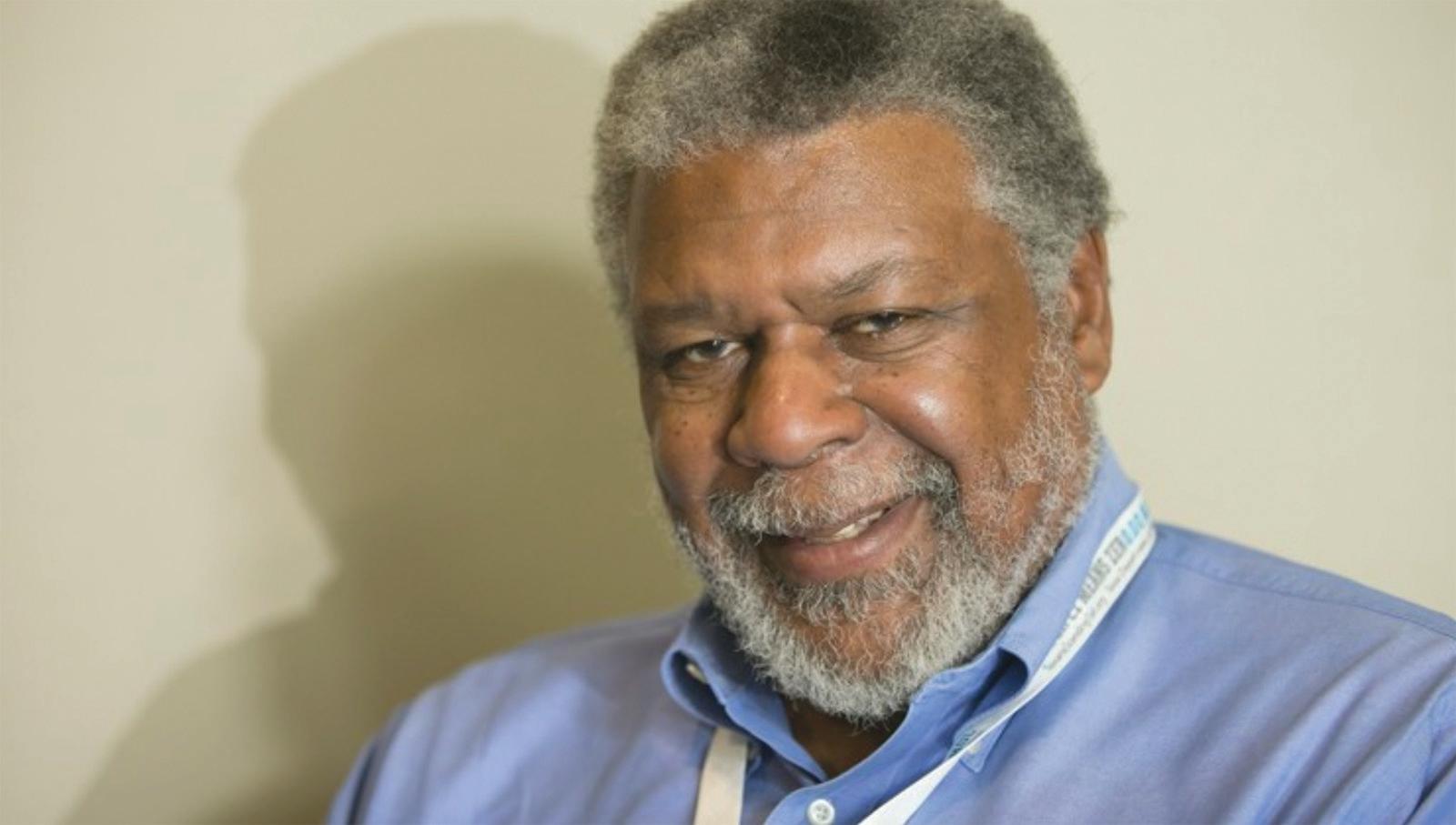
Josh Wright runs a small eCommerce business that helps consumers get good deals on cell phones and plans but doesn’t believe employers should demand everyone return to the office.
Wright says that people who work at home are more productive because they do not have as many distractions at work.
When people work at home, they can be more focused and focus on their work, Wright said.
“For a small eCommerce business like mine, the cost savings associated with working from home can be significant,” he added.
“Remote work eliminates the need for a physical office space, and employees can use their own equipment, which reduces overhead costs.”
However, Wright’s view isn’t shared by many other employers.
According to the Wall Street Journal, employers are losing their patience with empty desks in the office.

The newspaper noted that companies like Vanguard Group, Paycom Software, and others have told employees to come in to work more in 2023 to save money.
Many employers have asserted that in-person work helps with problem-solving, training new employees, and it reinforces corporate culture.
“Employers face a tough decision. Forcing employees to return can cause many of these employees to seek other employment,” Caroline Duggan, Chief Brand Officer for
Lumineux, said in an email.
“Employees have found they enjoy the flexibility and better work/life balance they have achieved through remote work. It will be difficult to get them to give that up.”
Duggan said that many federal employees have continued working remotely.
She noted that District of Columbia Mayor Muriel Bowser had urged President Joe Biden to either have them return or release the buildings they formerly occupied, so the city could create more housing space.
“The larger issue seems to be around the question of productivity,” Duggan added.
“Are employees as productive working from home as in the office? Employers will need to balance their needs with retention to determine what works best for their employees and their company.”
However, McKenna Moore, an associate editor at LinkedIn, said remote work may be past its prime.
Moore wrote that, in the current U.S. job market, many employers have taken remote-work arrangements off the table.
“Data from LinkedIn’s Workforce Report shows the rapid rise and fall of employers’ willingness to target remote candidates,” Moore reported.
In an analysis of over 60 million paid job postings on LinkedIn since January 2021, researchers found that remote jobs had the highest number of jobs in March 2022.
But Moore noted that spike gave way to an abrupt decline; in November 2022, barely 14% of paid job postings invited remote applicants.
“It might be helpful for businesses to have workers located in an office, where they can keep an eye on them
and offer constructive criticism to guarantee timely project completion,” said Calvin Willis, a tech entrepreneur.
“An organization might see, for instance, that its remote workers are constantly a few days behind schedule on projects, whereas those based in the office never miss a deadline,” Willis continued.
“Having everyone in the same room at the same time encourages conversation and cooperation among workers, which isn’t always easy to accomplish when everyone has different hours.”
The Wall Street Journal reported that, for much of the pandemic, companies took a “fairly soft” approach to policy enforcement, fearful that too rigid a stance on inoffice work could harm morale or lead to turnover.
“Although companies set office policies, some managers largely allowed workers to ignore them,” the newspaper reported. The average office occupancy in 10 major U.S. Cities remained below 50% for much of 2022, according to data from security firm Kastle Systems.
According to the newspaper, most employees want to work in an office at least a few days a week. They also said that many workers see the benefits of working in an office.
Meanwhile, some employers insisted that enforcing the rules is a matter of fairness to the workers who have been complying.
“Uneven and inconsistent adoption has created inequities in how the model is applied and has made it difficult to realize the benefits of in-person learning, collaboration and connection,” Vanguard officials said in a memo, according to the Journal.
Some Vanguard employees said they were told by their managers that if they didn’t comply with the return-to-
office policy, they would be terminated without severance. At Paycom, nearly 80% of the company’s employees are already working five days a week at the company’s headquarters.
Many employees began returning to the office in August 2021.
“From the start of the pandemic, Paycom communicated that working from home would be a temporary solution while we prioritized everyone’s health and well-being,” a spokesman told the Journal.
What New Bills Have Kern County State Legislators Introduced So Far, This Year?
 By CRISTIAN CERDA
South Kern Sol
By CRISTIAN CERDA
South Kern Sol
When looking at a map of state legislative districts and Kern County, a total of five state representatives represent Kern County — two of them in the state senate and three in the state assembly. The two state senators are Senate Melissa Hurtado (D) and Senator Shannon Grove (R). The three assembly members are newly elected Assemblywoman Jasmeet Bains (D), Assemblyman Vince Fong (R), and Assemblyman Tom Lackey (R). All of which have introduced new bills this year. Here are two of the most bills that have been introduced by each representative this year so far.
Melissa Hurtado (D) – Bakersfield
SB-245: This bill, introduced on January 26, 2023, by Hurtado and Susan Rubio, would remove age limitations on access to CalFresh and would allow anyone to be eligible for the program if the individual’s immigration is the only cause for ineligibility. The bill would also impose a statemandated local program. The bill currently awaits review by the Human Services Committee.
SB-244: Senate bill 245 would prohibit all foreign governments from purchasing, leasing, acquiring, or holding an interest in agricultural land within California. However, the bill makes exceptions if a government had previously held before January 1, 2024. The bill was introduced on January 19, 2023, and is also coauthored by neighboring Senator Shannon Grove. The bill is currently under review by the Judiciary Committee. Shannon Grove (R) – Bakersfield
SB-237: Bill 237 would punish the possession, sale, or purchase for sale of fentanyl by imprisonment for 4 to 6 years. It would punish the transportation of fentanyl by imprisonment for 7 to 9 years. The bill would also punish the trafficking of fentanyl by imprisonment for 7, 10, or 13 years. All imprisonment would be at a county jail. The bill was introduced on January 24, 2023, by senators Grove, Brian Dahle (SD-01), and Susan Rubio (SD-22). SB-237 currently sits in the Public Safety Committee.
SB-293: This bill would require the Department of Education to make statewide summative California Assessment of Student Performance and Progress (CAASPP) results available to the public by October 1 each year. The bill would also require the state board’s calendar for delivering results to the department to be consistent with the new deadline. Senator Grove introduced the bill on February 2, 2023. The bill currently awaits review by the Public Safety Committee.
Dr. Jasmeet Bains (D) – Bakersfield
AB-786: Assembly bill 786 would require the California Department of Aging to establish the Alzheimer’s and Dementia Caregiver Education and Support Grant Program. This five-year grant program would expand access to evidence-supported dementia caregiver education, training, and support to caregivers of those with dementia. AB-786 was introduced on February 13 of this year. The bill is currently under review by the Aging and Long-Term Care Committee.
AB-1203: This bill would exempt breast pumps, breast pump storage and collection supplies, breast pump kits,
and breast pads from sales and use taxes in California. The bill does not require the state to reimburse local agencies for sales and use tax revenue loss due to the bill. Dr. Bains introduced the bill on February 16, this year. The bill is currently pending referral.
Vince Fong (R) – Bakersfield
AB-641: Introduced by Fong on February 9, this bill would expand the definition of an automobile dismantler and aims to target catalytic converter thefts. The new definition would now include a person who keeps or maintains on property owned by the person, or under their possession or control two or more used catalytic converters that have been cut from a motor vehicle using a sharp implement. The bill is currently under review by the Transportation Committee.
AB-619: This bill would authorize a nonprofit entity that provides services contracted with a state agency, during a state of emergency, to request the state agency to allow that nonprofit to modify the method in which it provides those services. It is to be allowed so long as the purpose of the contract is served. The bill would require the state agency and the nonprofit entity to prepare and sign an addendum to the contract establishing the terms and conditions of the modification if agreed upon by the state agency. It would also require nonprofits to notify each state agency from which it receives funding of a closure or of an impacted program and identify and thoroughly document all expenditures associated with the closed program and retain documentation to justify expenses and to support claiming continued state funding, as specified. The bill
would require these state agencies to ensure that funding is available to pay for canceled services, closed programs, or reduced service levels. The bill was introduced by Fong on February 9 of this year and currently is under review by the Emergency Management Committee.
Tom Lackey (R) – PalmdaleAB-1544: This bill would authorize a police or sheriff’s department that is investigating an open case of suspected child abuse or severe neglect to forward to the Department of Justice a report in writing of its investigation made on or after January 1, 2024. Current California law prohibits police or sheriff’s departments in the state from doing so. The bill was introduced by Lackey on February 17 of this year and is currently pending referral.
AB-622: Currently, existing law provides that a person who leaves their home to go into another state or precinct in this state for temporary purposes (due to natural disaster), with the intention of returning, does not lose their domicile. The state defines domicile as someone’s “residence” for voting purposes. Under AB-622, people who simply return to their districts would also not lose their domicile as well. The bill was introduced by Lackey on February 9 of this year and is currently pending referral. As the new year goes on, it will be interesting to see which bills will be passed by the state legislature and ultimately be signed by the governor. Residents of Kern County will see firsthand what their representatives have been advocating for in Sacramento.
